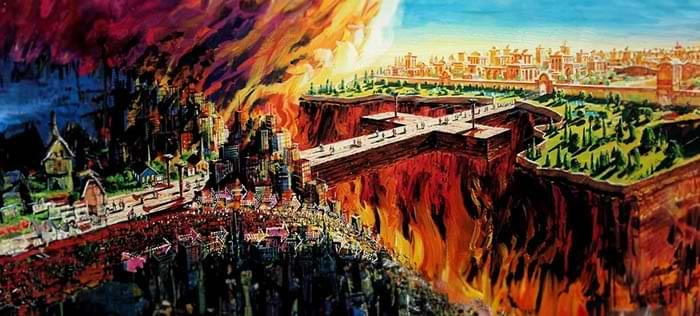Romans 5:8
But God commendeth his love toward us, in that, while we were yet sinners, Christ died for us.
The question we have to face is which of these is the answer to the problem of sin. Does sin have to be expiated in hell, or was it taken care of on Calvary? There is a wide difference of opinion.
"Christ died for the ungodly." Rom. 5:6. It does not say that He died for the godly. It does not say that He died for the saints. All who do not believe are ungodly, without God. All such are alienated from the life that is in God. Christ died for all these. We find no exception, and no one is too wicked to be excluded.
"While we were yet sinners, Christ died for us." Rom. 5:8. Christ Jesus came into the world to save sinners. 1 Tim. 1:15. These two Scriptures are on each side of The Dispensational Boundary. But they teach a common Truth. Christ died for sinners. Now this includes the ungodly, for they are sinners. But it includes more than that. The argument in Romans is that all have sinned, both Jewish and Gentile believers, and come short of The Glory of God. So every man is classed as a sinner, whether he be a believer or unbeliever. Christ then died for all.
"Behold the Lamb of God, which taketh away the sin of the world." John 1:29. Here is a sweeping statement. All men have been concluded under sin. Now here we find that the Lamb of God takes away the sin of the world. That means everybody. No exceptions are mentioned anywhere. That would leave no one who would have to go to an imaginary hell and suffer endless torments and torture for his sins. They have been taken away. There is none left for him to face.
"God was in Christ, reconciling the world unto Himself, not imputing their trespasses unto them." 2 Cor. 5:19. The world here covers just as much territory as it does in John 3:16 or John 1:29. It means everybody and nowhere does the Word of God admit of an exception to this. The blood of the Lamb of God has taken away sin. It has been taken away by virtue of the fact that it is not imputed to anybody. Every person that has lived has come under this provision. It was foreshadowed in the sacrifice made in Gen. 3:21. Those who would follow in the way of Cain do away with the blood sacrifice, get their salvation by works, and relegate the rest to a hell of their imagination to serve out their endless term of misery for their sins. This denies that Christ was the Lamb of God. This denies that He died for the ungodly. This denies that He died for sinners. But remember this; reconciliation does not give life. It only prepares all mankind to receive life if they care for it and desire it. All are on the same level. There is nothing between them except their own willfulness and rejection of The Life offered.
"In Whom we have redemption through His blood, the forgiveness of sins." Eph 1:7. "In whom we have redemption through His blood, the forgiveness of sins." Col. 1:14. Again, we are on this side of the dispensational frontier. Redemption is not dispensational but entirely doctrinal. To say that anyone would have to suffer for his sins is only to deny this redemption.
"Jesus, our Lord ...was raised again for our justification." Rom. 4:24-25. The work is finished. Every sin is taken care of. Therefore He was Resurrected.

